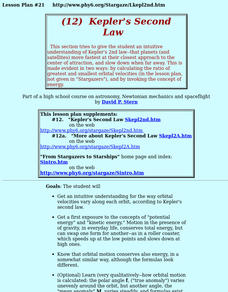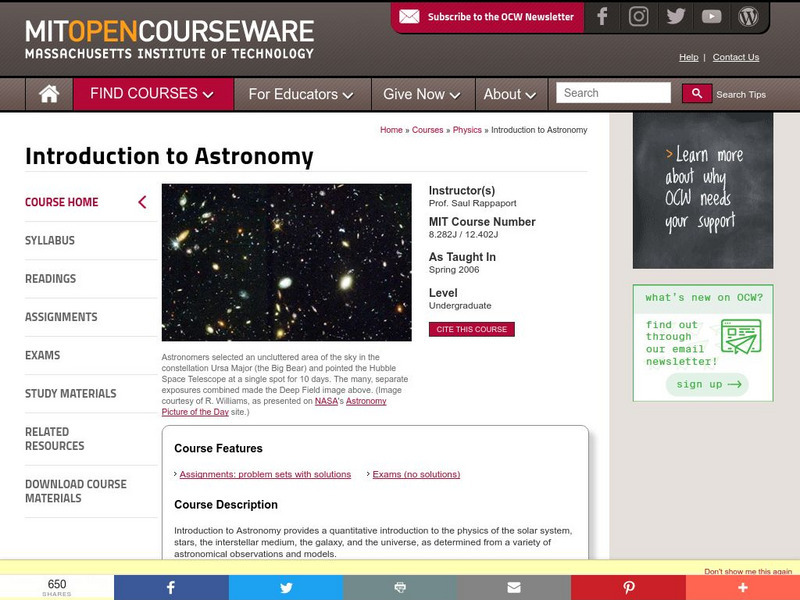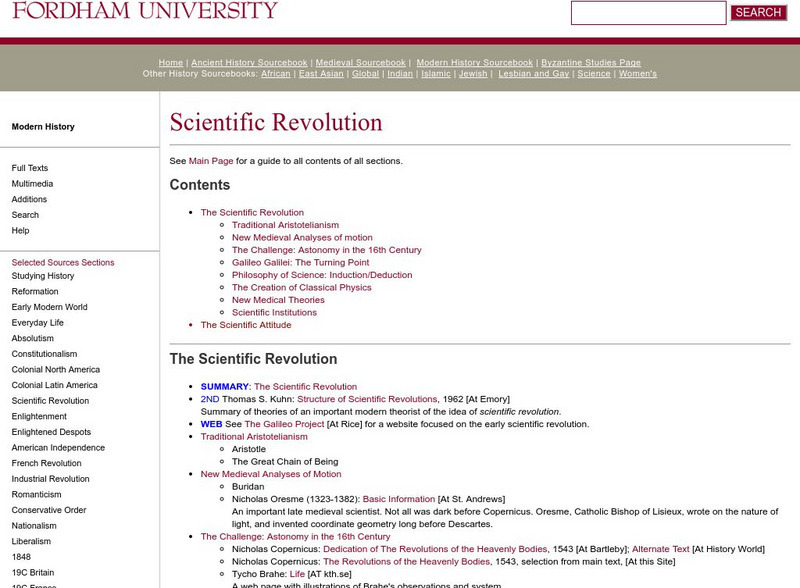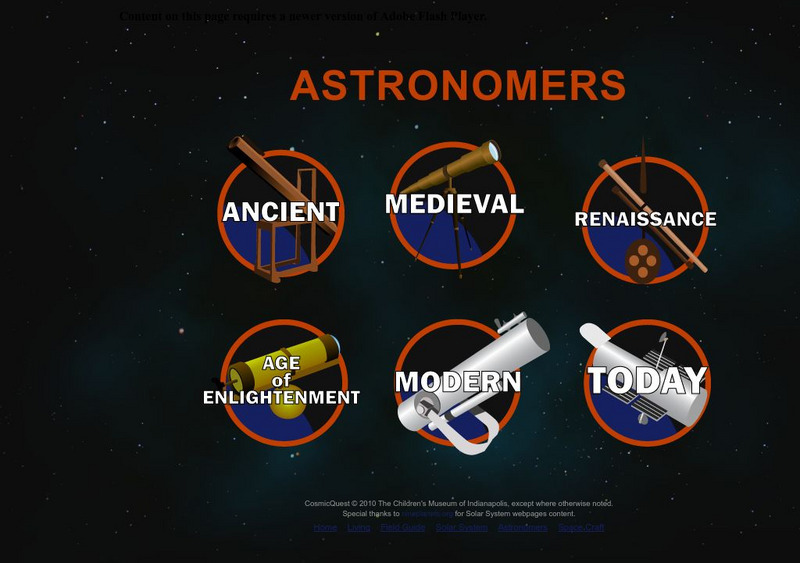Curated OER
Seasons of the Year
Students examine how the link between the tilt of the Earth's axis to the ecliptic and seasons of the year--length of day, effectiveness of sunlight, polar day and night, and seasons south and north of the equator, as well as near it.
Curated OER
Newton's 3rd Law
Learners examine how the formal definition of Newton's 3rd law: forces always originate in pairs, equal in magnitude and opposite in direction. They also examine how the informal, qualitative version: Each action has an equal and...
Curated OER
Motion in a Circle
Students explore uniform circular motion, and the relation of its frequency of N revolutions/sec with the peripheral velocity v and with the rotation period T. They examine how uniform circular motion is a type of accelerated motion.
Curated OER
Frames of Reference: The Basics
Learners learn the concept of frames of reference in physics. They examine how two frames of reference, each moving with respect to the other with a constant velocity v (constant speed, constant direction).
Curated OER
Airplane flight
High schoolers learn the basic concepts about airplane flight. They learn the reason jetliner wings are swept back and why jet engines have replaced propellers in high-speed flight.
Curated OER
#22 Frames of Reference: The Basics
Students explore the concept of frames of reference in physics.
Curated OER
Kepler's Second Law
Students gain an understanding of Kepler's 2nd law--that planets (and satellites) move fastest at their closest approach to the center of attraction, and slow down when far away. They explore the concepts of "potential energy" and...
Curated OER
Graphs And Ellipses
Learners become acquainted with linear graphs, the parabola and the rectangular hyperbola. Also prepare tables of paired values as preparation for plotting a line. They study the cartesian equation of an ellipse, with a worked example.
Curated OER
The Mystery Constellation
Students decipher two teacher chosen mystery constellations a month. They listen to stories, explain what they know about constellations and name the mystery constellation.
Curated OER
Eyes on the Sky, Feet on the Ground
Fifth graders participate in online astronomy activities with hundreds of fun explorations into astronomy as a classroom tool for learning how to theorize, experiment, and analyze data.
California Institute of Technology
Cool Cosmos: Ask an Astronomer
Resource compiles a list of most frequently asked questions about Mercury. Each question is linked to an astronomer's answer. Kids can explore many aspects of this wonderful planet.
California Institute of Technology
Cool Cosmos: Ask an Astronomer: Comets
Resource provides easy to understand information about comets. Click on the frequently asked question link to find out more about these mysterious celestial bodies.
Exploratorium
Exploratorium: A Guide to Astronomy Resources
A portal to resources on the sun, the Earth's neighboring planets, and the weather in space. Find out why Saturn is the "jewel of the Solar System" and explore what happens when Venus and Mercury make their rare transits across the sun.
Massachusetts Institute of Technology
Mit: Open Course Ware: Courses: Physics: Introduction to Astronomy
A university-level introduction to basic astronomy. Includes course readings, assignments, exams, and study notes with links to images and to biographical profiles of famous astronomers.
National Science Foundation
National Science Foundation: Astronomy and Space: Research Overview
Explore some of our most fundamental questions about space exploration with this research overview collected by scientists at the National Science Foundation. Additionally, experience deep space first-hand with telescope interactives.
California Institute of Technology
Ipac at Cal Tech/what Are Supernovae?
Basic characteristics and definition, how astronomers study supernovae, the types of supernovae, where they occur, theories about supernovae, what supernovae tell us about the universe, and the effects of supernovae.
Georgia State University
Georgia State University: Hyper Physics: Supernovae
This site from Georgia State Department Astronomy & Physics provides information on the Supernovae. "A supernova is an explosion of a massive supergiant star." Find out much more at this site.
Harvard University
Harvard Smithsonian Center for Astrophysics: The Constellations
Based on images from the Chandra X-Ray Observatory, this is an excellent glossary of all the constellations, including the ones that make up the Zodiac. Find images, photographs, and an excellent background narratives concerning each...
Internet History Sourcebooks Project
Fordham University: Modern History Sourcebook: Isaac Newton
This site from Fordham University links to excerpts of Newton's major works. Please scroll down to find the section on Newton titled "The Creation of Classical Physics." You will be able to actually read some of Newton's work! Read...
Internet History Sourcebooks Project
Fordham University: Modern History Sourcebook: Letters on Newton
An interesting site from Fordham University that provides letters Voltaire wrote regarding Newton and his work.
Internet History Sourcebooks Project
Fordham University: Modern History Sourcebook: Principles of Natural Philosophy
This site from Fordham University is an exerpt from Newton's famous "Principia."
Children's Museum
Children's Museum of Indianapolis: Cosmic Quest: Astronomers
Explore the achievements of notable astronomers beginning with ancient times through modern space explorers.
PBS
Pbs Learning Media: Above the Clouds: Telescopes on Mauna Kea
This video segment adapted from First Light explains why the highest peak in the Pacific, Mauna Kea, is an ideal site for astronomical observations. Featured are new telescope technologies that allow astronomers to explore the universe...
























